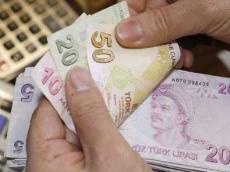|
|
TODAY.AZ / World news
Iran, Turkey eye using national currencies in trade, minister says
29 April 2016 [15:17] - TODAY.AZ

By Aynur Karimova
Iran and Turkey are interested in using their national currencies - the rial and the lira - for mutual payments in the bilateral trade, Mustafa Elitas believes.
The Turkish Economy Minister told Trend on April 28 that this is necessary for avoiding the dependence on fluctuations in the foreign exchange rate.
"Iran and Turkey agreed in April to develop the mutual payments using national currencies," he said, adding that Turkish companies prefer to use the Turkish lira in trade with Iran.
The minister also noted that during the talks with his Iranian counterpart, he repeatedly emphasized the importance of using the national currencies in mutual payments between the two countries.
"We see that the Iranian side also wants to use the national currencies in the bilateral trade," Elitas added.
Turkey has been trying to develop its economic relations with Iran after the removal of international sanctions from the Islamic Republic on January 16, 2016.
The trade turnover between Turkey and Iran stood at $9.76 billion in 2015, as compared to $13.719 billion in 2014, according to the Turkish Statistical Institute. However, Ankara and Tehran intend to increase the trade turnover to $30 billion.
Elitas believes that one of the important factors for achieving this goal is to develop the preferential trade between the two countries.
Ankara and Tehran make every effort in this regard, he added.
"The relevant structures of Iran and Turkey are holding talks in order to expand the list of goods in the preferential trade," he stressed.
In early April, Turkey's Development Minister Cevdet Yilmaz said that one third of trade between Turkey and Iran is now conducted in the Turkish lira or the Iranian rial.
Experts believe that the background behind using the Turkish lira and the Iranian rial may be seen in the context of the increased volatility of the lira visa-a-vis the USD and the euro, exacerbated by political and social challenges which have increased country specific risk.
They say that these risks have lead to a serious fall in Turkey's earnings in key currencies such as the U.S. dollar and the euro.
Mehrdad Emadi, the consultant at the UK-based Betamatrix International Consultancy believes that the reference of the Turkish minister to the use of the national currencies carries a hidden message.
"The message may be that Ankara is prepared to move away from Washington and get closer to Tehran if the economic gains of growing its trade and investment relationship with Iran outweigh the political and foreign aid cost of moving even further from Washington," he told Trend earlier.
Closer economic ties between Tehran and Ankara based on the use of the lira and rial will not only create a deeper bind between the economies of the two countries, but also become a new step in gradually reducing the reliance on the U.S. dollar as the world's reserve currency.
The experts believe that if the use of the national currencies in trade its reliability in terms of facilitating bilateral trade, this experience can be applied in near future between Iran and India, among Russia, Iran and China, as well as Iran, Turkey and Azerbaijan and even perhaps between Turkey and India.
Emadi said that for Turkey, being able to use the lira to pay for at least one third of its imports from Iran will not only partially alleviate the shortage of the dollar and the euro, but also be a meaningful message to the EU that Turkey has other policy options to develop its economy and trade and the EU is not the only show in town.
However, according to the expert, such a move carries additional risks with it, some of which may be quite costly if Tehran and Ankara do not follow the basic rules in managing their trade most notably avoiding competitive devaluation.
URL: http://www.today.az/news/regions/150256.html
 Print version
Print version
Connect with us. Get latest news and updates.
See Also
- 25 September 2025 [09:00]
FIFA backs expanding World Cup to 64 teams - 25 September 2025 [08:00]
China: Trade with Russia in line with WTO rules - 24 September 2025 [09:00]
Russia denies involvement in Denmark drone incident - 24 September 2025 [08:00]
Poland to reopen border with Belarus - 23 September 2025 [14:39]
Pashinyan challenges former Armenian presidents to public debate over war accusations - 23 September 2025 [09:00]
S Korea, Saudi Arabia discuss expanding arms cooperation - 23 September 2025 [08:00]
Germany plans for 1,000 wounded troops per day in case of conflict with Russia - 22 September 2025 [09:00]
Over 1.1 million Italians suffer from Alzheimer’s - 22 September 2025 [08:00]
South Korea pays $3.3 billion in U.S. tariffs, sixth-highest worldwide - 21 September 2025 [23:30]
Trump announces first face-to-face with Xi since 2019 at APEC
Most Popular
 Baku and Beijing are making "green" plans
Baku and Beijing are making "green" plans
 Azerbaijan, Qatar explore joint investment and strategic sector cooperation
Azerbaijan, Qatar explore joint investment and strategic sector cooperation
 From hero to silence, the fate of Bagrat Galstanyan in the Armenian opposition
From hero to silence, the fate of Bagrat Galstanyan in the Armenian opposition
 Cooperation between Azerbaijan, Saudi Arabia in energy sector reached new level - President
Cooperation between Azerbaijan, Saudi Arabia in energy sector reached new level - President
 Azerbaijani, Armenian foreign ministers meet at UN in New York
Azerbaijani, Armenian foreign ministers meet at UN in New York
 Azerbaijan prepares bill on paid paternity leave
Azerbaijan prepares bill on paid paternity leave
 President Ilham Aliyev sends congratulatory letter to King of Saudi Arabia
President Ilham Aliyev sends congratulatory letter to King of Saudi Arabia
